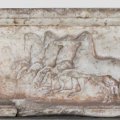Queensland’s blossoming arts sector may have impressed a visiting British arts scholar, but she says the state government needs to protect it.
Professor Deborah Howard, Professor of Architectural History at the University of Cambridge, visited The University of Queensland as part of a week-long visiting arts professorship.
Speaking a day after the Queensland Premiers’ Literary Awards were controversially cancelled, she said governments needed to consider the economic and civilizing benefits the arts bring to the state.
“Within academia and in the wider community, the arts sector is threatened as never before by lack of resources, in comparison with the competing fields of science, technology and medicine,” Professor Howard said.
“The arts should be seen by governments not only as a potentially civilising influence, but also as a source of economic gain. People travel to visit museums, theatres, arts festivals, art galleries, etcetera, and these visitors also bring revenues.”
The arts are not just for recreation or entertainment. They embody the cultural identity of a society and express its deepest values, she said.
“As Cicero recognised in antiquity, a beautiful city and an ordered society are inseparable. If people live in well-designed, well-planned surroundings, they share a sense of belonging to the community, encouraging them to respect and enjoy their streets, buildings and open spaces,” she said.
“As soon as this sense of shared culture and belonging breaks down, a wider loss of social cohesion can set in, leading to vandalism and boorishness. How can any community possibly understand the historical significance of its own surroundings and generate its own cultural identity without support from the political bodies?”
Most high-level cultural activities cannot be completely self-funding, and sometimes it falls to public bodies and benefactors to support the arts. She suggested tax breaks for donors to the arts, much like in America.
Professor Howard presented the annual Daphne Mayo Lecture at UQ, drawing links between art and good citizenship. The lecture attracted a full house of 250 people, the biggest turnout in the event’s 10-year history. The lecture is part of the Daphne Mayo Visiting Professorship in Visual Culture, run by the UQ School of English, Media Studies and Art History (EMSAH) and the UQ Art Museum. It is heavily supported by the Alumni Friends of the University of Queensland.
Professor Howard, who has studied the arts extensively in Venice and held visiting appointments at Harvard, Yale, Princeton, said there was a real “sense of belonging” in Queensland, and an awareness of historical traditions and values.
“But this is fragile and needs to be cherished and protected,” she said.
“Brisbane is a beautiful city, and I have been very impressed by the museums and libraries, as well as by the care taken to protect the riverside walks as pleasant amenities. There seems to be a good deal of encouragement for green transport. In the downtown area there seems to be some positive encouragement to protect historical landmarks.”
She also reported to be overwhelmed by the interest in the events in which she had been involved that “suggests an open-minded, lively academic community at The University of Queensland”.
EMSAH Senior Lecturer and former judge of the Premier’s Literary Awards Bronwyn Lea said Queensland had a right to be proud of its arts history, particularly a distinguished literary heritage that has shared Queensland’s landscapes and characters with international readers.
“John Blight and Thea Astley hailed from Queensland, as do David Malouf, Janette Turner Hospital, John Birmingham, Nick Earls and Kate Morton. Queensland has nurtured a particularly impressive line-up of poets – Peter Porter, Gwen Harwood and Judith Wright among them – as well as many of the nation’s celebrated indigenous writers, including Oodgeroo Noonuccal, Alexis Wright and Sam Wagan Watson.”
She said the Queensland Premier’s Literary Awards had been an important event in the state's literary calendar since 1999.
“They have celebrated quality writing, as viewed from a Queensland perspective, and helped to create a sense of community. Importantly they have stimulated public conversation and debate.
They also contributed greatly to the book industry offering authors (award-winning and shortlisted) publicity, prominent placement on library and bookshops and award decals that improved sales.
“The prestige of literary awards also encourages Australian publishers to invest in niche genres such as poetry and short fiction.”
She said the cancellation had come as shock to Australia’s book industry, already reeling from the imposed transition from print to digital publishing.
“Given the tight fiscal circumstances, the arts sector would do well to consider new models for promoting stronger engagement between arts organisations and business communities. However, we must be realistic. We cannot expect the same level of private philanthropy to the arts that America, for example, with its low tax structure enjoys,” she said.
“Now is the time to celebrate the contribution the language arts make to cultural life, not to beleaguer the sector with cutbacks that are more ideological than judicious.”
Media contact: Bronwyn Lea at EMSAH (07 3365 2999 or b.lea@uq.edu.au) or Janelle Kirkland at UQ Communications (07 3346 0561 or j.kirkland@uq.edu.au).
.jpg)








